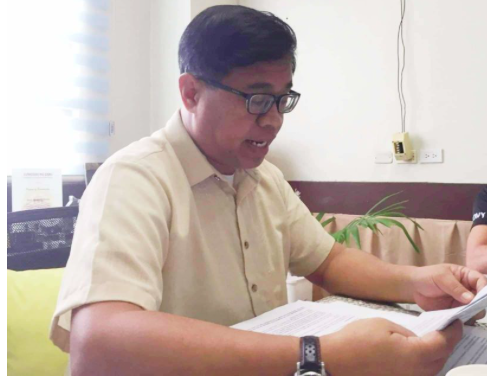
Cebu City Councilor Alvin Dizon | CDN Digital File Photo
CEBU CITY, Philippines — The minority bloc of the Cebu City Council is questioning the scientific basis of the rapid mass testing conducted in the barangays for the Project Balik Buhay (PBB).
This after the actual rapid testing did not coincide with what was stipulated in Executive Order No. 75 signed by Cebu City Mayor Edgardo Labella.
Councilor Alvin Dizon, during the regular session on Tuesday, May 19, 2020, raised the concern on why the turnout of the mass testing in the city was lesser than expected.
Read: Rapid antibody test kits: A closer look
Cebu City only collected 11,881 samples compared to its target of 17,535, or an accomplishment rate of 67 percent.
Dizon said that this low turnout shows that the residents did not trust the rapid testing being conducted by the PBB.
Councilor Franklyn Ong, who is the president of the Association of Barangay Councils, said that some barangays had to provide incentives to residents who submitted themselves to the testing just to increase the turnout.
‘You keep on changing the guidelines. Before, it was a random list of residents, but the list did not work because some of those in the list are dead. Now, anyone can undergo a rapid test. How do you expect us to believe that the methodology is still scientific?’
The incentives were also given after the initial deadline of the city on May 15, when the city recorded only 40 percent accomplishment. The testing was extended until May 20.
Furthermore, Ong questioned why the city is only targetting 17,000 families when originally, it targeted 23,000. This decreased number no longer represents 10 percent of the city’s population, which was the original target of the project.
Read: Cebu biz groups: PBB is our passport to new normal
“You keep on changing the guidelines. Before, it was a random list of residents, but the list did not work because some of those in the list are dead. Now, anyone can undergo a rapid test. How do you expect us to believe that the methodology is still scientific?” said Ong.
Ong said that the PBB has a noble purpose and the barangays are eager to support this project, but he said the project should remain scientific for it to work.
Councilor Raymond Alvin Garcia, the majority floor leader of the council, defended the project and said that the Department of Health (DOH) only needs the 17,000 samples to create a database or analyze the extent of the spread of the virus.
“They told me that it that they don’t need a hundred percent. That small percentage is already indicative, we can already make a decision,” said Garcia.
Read: Business groups support Project Balik Buhay
Councilor Leah Japson said that she supports the PBB, but the methodology of the project is not sound, with many issues surrounding it.
Councilor Nestor Archival, the minority floor leader, even questioned the sensitivity of the rapid test kits and if this was approved by the Department of Health in Central Visayas (DOH-7).
The DOH-7 repeatedly defended the test kits and said that though it cannot be a stand-alone test, it is precise enough to be used in a strategic mass testing.
The test identifies antibodies associated with the virus, and those who prove positive to the antibodies will be swabbed for confirmation of the presence of the virus.
Yet, the minority bloc of the city council said that DOH-7 has not officially issued documents recommending the use of these test kits for the mass testing, which is an indication that the rapid test may not be recommended after all.
Majority bloc prevails
With this, the minority bloc attempted to pass a resolution to prevent the city from using public funds for the test kits, stating that the Health Technology Assessment Council (HTAC) does not recommend rapid testing.
“No public fund shall be used to pay for any COVID-19 rapid antibody-based test kits,” the resolution quoted HTAC.
Archival said the city is wasting money for mass testing that is inconclusive and cannot provide accurate information on the presence of the virus.
However, the resolution did not pass, as the majority bloc prevailed.
Eight councilors of the minority bloc voted for the resolution. These are Archival, Dizon, Ong, Japson, Jessica Resch, Joy Young, Raul Alcoseba, and Eugenio Gabuya, Jr.
They were supposedly tied with the majority bloc who objected to the resolution. These were Garcia, Junjun Osmeña, Prisca Niña Mabatid, Jerry Guardo, Eduardo Rama, Jr., Donaldo Hontiveros, Joel Garganera, and Antonio Cuenco.
Only Councilor David Tumulak abstained from voting. He said he wants to hear the recommendation of the DOH on the matter.
Vice Mayor Michael Rama, who presided over the session broke the tie, as a parliamentary procedure.
He sided with the majority bloc stating that the funds and the project have already been approved by the council in previous sessions.
The matter has also been discussed several times and the council has made its decision in the past. He said the council should now support the project.
PBB is a strategic mass testing program initiated by the Office of the Presidential Assistant for the Visayas (OPAV) together with the tri-cities of Cebu, Mandaue, and Lapu-Lapu, in collaboration with the DOH-7. /bmjo